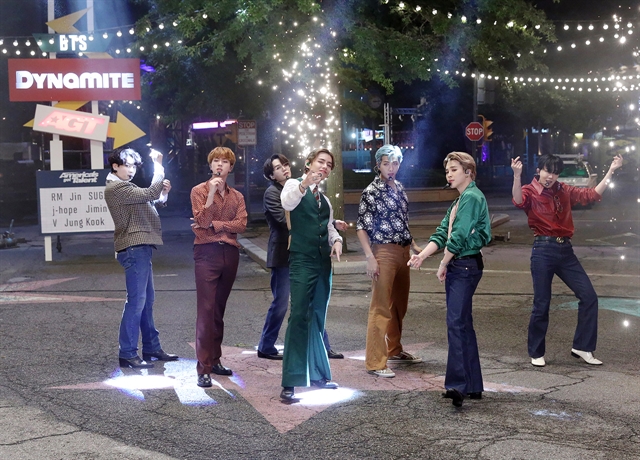 World
World


|
| To date, BTS remains the only K-pop act to have received Grammy nominations. Photo courtesy of Big Hit Music |
SEOUL — Industry insiders and music critics had already anticipated that no K-pop group would make it to the 67th Grammy Awards – not even as performers – at the ceremony held in Los Angeles on Sunday.
Acknowledging that K-pop is still perceived as a subculture in the US, enjoyed mainly by dedicated fans, experts believe that instead of striving for Grammy recognition, K-pop artists should focus on forging their own paths.
As one of the most prestigious music awards in the world, this year’s Grammys saw top global artists nominated across various categories.
Beyonce, who led with 11 nominations, was joined by Taylor Swift, Billie Eilish, Kendrick Lamar, Post Malone, Charli XCX and Sabrina Carpenter in the major categories. However, no K-pop artists were nominated this year.
To date, BTS remains the only K-pop act to have received Grammy nominations. The group first attended the Grammy Awards as presenters in 2019, performed in a special segment the next year in 2020 and went on to secure nominations the next three consecutive years. The group also took the stage to perform at the awards ceremonies in 2021 and 2022.
A K-pop agency official attributed the absence of K-pop at this year's Grammys to the lack of a group with the same scale of global dominance as BTS.
“No K-pop group apart from BTS has ever been nominated, and no group has reached their level of influence yet. While Stray Kids and TXT have shown growth, they haven’t reached the scale required for Grammy consideration,” the official said.
He also pointed out that K-pop's musicality has yet to be truly recognised by the Grammy committee.
"Latin pop and Afrobeats have established themselves as distinct genres, but K-pop lacks a clearly defined musical identity in the Western music industry. In the US, performance-driven music, which is a core element of K-pop, still struggles to gain industry recognition,” the official added.
Music critic Lim Hee-yun echoed similar sentiments, describing K-pop as a niche market in the US rather than mainstream.
“K-pop is still a subculture in the US,” Lim said. "While BTS and Blackpink enjoy global popularity, the genre remains a niche driven by dedicated fans."
“The Grammys are an American awards show created by key figures in the US music industry to recognise their own. It is highly conservative and exclusive,” he added. “The fact that a K-pop group has even been nominated three times is nothing short of a miracle.”
Beyond the genre’s status in the US, long-standing criticism of the Grammys for its racial bias and discrimination has also been cited as a factor influencing winners and nominees.
Beyonce, who holds a record 99 Grammy nominations and 35 wins, had secured the award for song of the year only once, with Single Ladies in 2010. On her fourth shot, she finally won album of the year on Sunday for Cowboy Carter.
This long pattern has fueled criticism of the Grammys as being “white-dominated”, with winners determined by votes from the 13,000-member Recording Academy.
Culture critic Jeong Deok-hyun said that while such biases do exist, the Grammys also uphold a certain sense of musical standards.
“The Grammys tends to apply stricter musical criteria. While K-pop’s massive popularity doesn’t mean it lacks artistic achievement, it seems the Grammys doesn't view it as meeting its standards,” Jeong said on Monday. “Perhaps there are aspects of K-pop that simply don’t align with the Grammys' evaluation criteria.”
However, Jeong believes that the Grammys will not be able to ignore the changing industry trends forever.
“Just as the Academy Awards (for film) has evolved, the Grammys will also recognize a broader range of musical content over time. K-pop should focus on what it can achieve within its own industry flow. By doing so, musical accomplishments will naturally follow,” he said.
The K-pop agency official agreed that now is not a time for disappointment.
“K-pop is expanding and growing. It wasn’t so long ago that language barriers were seen as an obstacle to even being nominated at the Grammys,” the official said. “But hasn’t K-pop already moved past that?” The Korea Herald/ANN




